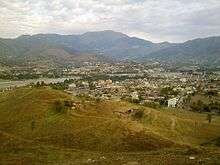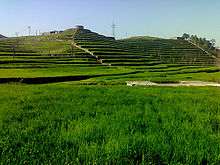Timergara
Timergara is the district headquarters of Lower Dir District in Pakistan. Timergara City is located on the east bank of the Panjkora River. It lies at an altitude of 823 metres (2,700 ft). The town is the site of excavated graves of Aryans, dating from 1500 to 600 BC. On the west side of the Panjkora River is the excavated site of Balambat. The site has been occupied continuously since the time of the Aryans in 1500 BC. Discoveries included houses dating from 500 BC and fire altars, showing that the people were fire worshippers. At the 1998 Census the town had a population of 43,774. Most of the main city lies on the bank of the river Panjkora, which separates Balambat from the main city.


Education
- Global Education Academy Timergara
- Abdul Wali Khan University Timergara Campus
- Absar School and College (Balambat)
- Government High School For Boys (Balambat)
- Government High School for Girls (Kandaro Malak Abad)
- GGMS Qazi Abad (Balambat)
- Dir Learning Academy (Chamanabad)
- Government High School (Haji Abad)
- Oxford Public School (Haji Abad)
- Islamia Standard High School (Haji Abad)
- Government Degree College for Boys
- Government Degree College for Girls
- Al Farooq Public School and College
- Wisdom House Public School and College
- Hira Public School and College
- Government College of Technology
- Qurtaba Model College
- Government Centennial Model High School
- FC Public School
- Patriots College
- Dr. AQ Khan Model College
- Tameer-e-Nao School and College
- Naeem Public School and College
- Islamia Model College
- Ayubi Model College
- Government College of Science
- Bilal Educational Academy
- Timergara Medical College
- Bukhara College of Science & Technology
- Al-Azhar College of Science & Technology
- The Educators School System
- The Air foundation School System
- Blue Chip School system Malak Abad
- The Smart School system Malak Abad
Universities in Timergara Dir Lower
Virtual University of Pakistan Timergara Campus
- Abdul Wali Khan University Timergara Campus
- Timergara medical College (Rani) pending from 2015
Education demographics in Lower Dir
The total gross enrollment ratio is 73.83%[1] excluding Kachi and 79.59% including Kachi class. Student teacher ratio is 43 students per teacher and there are 41 boys per male teacher and 46 girls per female teacher.
According to the recent Universal Primary Education (UPE) survey, the total number of children in the age group 5-7 years is 104,498[2] in which 56,937 [2] are boys and 47,561 are girls. Due to the limited access, the number of out-of-school children among the age group (5-7 years) are 25,169.[2] Almost 24% children of the total (age group 5–7 years) are out of school, in which 19% are boys and 30% are girls. These figures also include the dropout students both boys and girls.
Economy
The area has a weak agriculture infrastructure with no industry. The economy is completely based on the money sent back to the area by people (mainly males) living in the Middle East.
People
The people of Timergara are mainly Pashtun.The main tribes are Yousafzai and Utmankheil. Toar Baba (Abdur Rahim Khan), Timergara Babajee, Mian Baba and Jaloo Baba were the prominent religious figures of this area. Author Suleman Shahid discussed it very briefly in his recent book Ghumnam Riasat.[3] Abdur Rahim Khan migrated from Mandal (Bajawar Agency) in the late seventeenth century and settled in Timergara. He was known as Toar Baba for his piousness. Abdur Rahim Khan and Akhund Ilyas (d. 1676) were disciple of Shaikh Adam Binori. The Mandal (clan of Utmankheil) in Timergara or mostly called ShaiKhan are the descendants of Baba Abdur Rahim Khan.[4]
Climate
The summer season is hot and winter is extremely cold. A steep rise of temperature occurs from May to June, and then is very hot during July to the end of August, but during September the weather turns colder, especially at nights. A rapid fall of temperature occurs from October onwards. The coldest months are December and January. The mean minimum temperature recorded for the month of January is -8 °C.
Most of the rainfall occurs in the months of July, August, December, January and February. Towards the end of cold weather there are occasional thunderstorms and hail storms. Timergara is equally affected by global warming and climatic changes. In 2010 snowfall occurred in the city. It also received heavy floods which resulted in heavy damage to the infrastructure of the city in 2010. In March 2014 Panjkorha's level was rising again, which was a threat for the Balambat bridge.
Food
Popular foods are fish and beef cooked as chapli kabab, seekh kabab, and tikka. A tandoor (oven) for baking bread is present in many houses. Many inhabitants eat lobya (beans), saag and juwar doday (bread of maize). Lassi and saag with sookrak (sweet bread of maize) are also offered to guests.
Dress and ornaments
The people generally wear typical pashtoon dress. During the winter season, they wear a chadar (a long piece of cloth, mostly used to make the body warm) around the body along with qamiz (shirt) and shalwar. A chitrali woolen cap is used in winter, while a typical light Dirojee cap is worn in the summer. Sapley (studded, leather sandals) are the most common footwear. Shalwar qamiz and Burqa is the dress of women.
Shopping Malls
Timergara has now some shopping malls and boutiques. In earlier times people of Timergara went to Peshawar, Islamabad and Lahore for shopping but now every thing are easily available here in Timergara. People from as far as Miadan, Chakdara, Upper Dir, Swat and Chitral come here for shopping.
- G. City Mart
- Zam Zam Shopping Mart
- Rehman Tour and Shopping Mall
- ShaPosh Boutique
- Zeb City Center
- Fashion Mart
- Sana Safinaz
- Bareeze
- Gulistan Mega Mart
- Jan Mega Mall
- Beshe Boutique
- Khoobsurat Mega Mall
Festivals and fairs
Festivals and fairs are a part of the Pashtoon culture. The most important festivals are the two Eids (Eid al-Adha and Eid al-Fitr). Apart from that, most of the youngsters hike in the hills of Kumrat, Lawri Top, Laram, Shahi and Oshery in pleasant weather.
Population size and growth
When Timergara was declared as district headquarters of Dir, migration of the people to the city increased. The population of Timergara has increased about three fold since 1990.
Transport
Timergara Connects Bajawar, Dir Upper and Chitral to the rest of Khyber Pukhtunkhwa. Timergara has two busy bypass roads that connect different areas. The nearest airport is Peshawar International Airport, about ninety eight miles away. The buses, taxis and private vehicles are the main means of transport.
Sports
There are no big stadiums for sports activities but the youngsters have a great passion for sports like cricket, football, basketball, volleyball, hockey. Rest House Ground and FC Ground (Balambat) are the two main big sports events hosting sites. People of Timergara have made small grounds for sports facilities on the bank of rivers and as well as at the bottom of mountains.
Health facilities
The main healthcare facility is District Headquarters Hospital Timergara. There are many more private hospitals and a lot of hospitals available for ladies' treatment.
See also
References
Coordinates: 34°49′40″N 71°50′30″E / 34.82778°N 71.84167°E